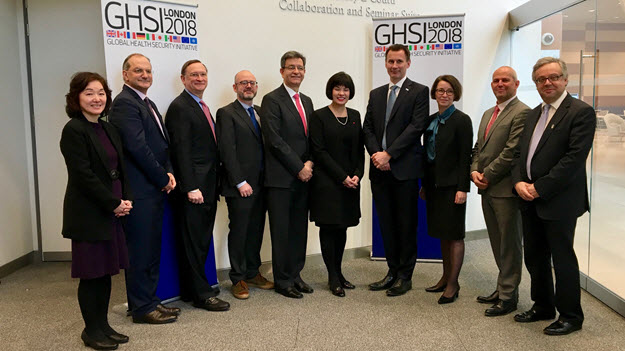One hundred years ago, the 1918 influenza pandemic caused massive devastation, ultimately infecting over 500 million people and killing between 50 and 100 million individuals worldwide. During recent outbreaks of influenza, Ebola, and other emerging infectious diseases, we have learned how critical collaboration among countries and international organizations is for an expedited and more effective response. Working together with our partners to strengthen global health security is crucial to protect Americans from pandemics and other health security threats despite whether they start at home or abroad.
 GHSI Heads of Delegations begin the 18th Ministerial Meeting of the Global Health Security Initiative.
*
GHSI Heads of Delegations begin the 18th Ministerial Meeting of the Global Health Security Initiative.
*
On March 9, the United Kingdom hosted the 18th Ministerial Meeting of the Global Health Security Initiative  (GHSI) in London, England. Ministers of health and delegations from the United States, Canada, France, Germany, Italy, Japan, Mexico, and the United Kingdom, along with leaders from the European Commission and the World Health Organization, came together to continue their work on strengthening their national and collective capacity to respond to chemical, biological, radiological, and nuclear (CBRN) threats and diseases with pandemic potential.
(GHSI) in London, England. Ministers of health and delegations from the United States, Canada, France, Germany, Italy, Japan, Mexico, and the United Kingdom, along with leaders from the European Commission and the World Health Organization, came together to continue their work on strengthening their national and collective capacity to respond to chemical, biological, radiological, and nuclear (CBRN) threats and diseases with pandemic potential.
Since 2001, these partner nations have worked together to share lessons learned from past crises and to prepare for future challenges by developing and implementing a myriad of policies and tools such as emergency communication and response coordination plans; platforms for threat and risk assessment and early alerting and reporting of health threats; sharing of scientific and public health knowledge and practices; and tackling critical global issues like sample sharing, international deployment of medical countermeasures, and the strengthening of laboratory networks, among others.
This year’s ministerial meeting focused on the need to have a common approach to evidence based, non-pharmaceutical interventions (NPIs) to slow the spread of influenza and on how best to communicate uncertainty and address public risk perception during a public health emergency.
In many cases, NPIs can be the first or only line of defense to help slow the spread of illness during a pandemic before vaccines and anti-viral medicines are available. When properly and timely Implemented, NPIs can delay an outbreak’s peak, reduce the total number of cases, and buy time for the development of a vaccine. Closing schools, canceling mass gatherings such as worship services and sports or entertainment events, and implementing border health measures to control the spread of disease can help save lives.
As parts of the United States deal with the current seasonal influenza, we can see the impacts of some of these interventions first hand. Schools in a dozen states have temporarily closed in hopes of curtailing the spread of disease. Of course in a flu pandemic, the decisions made by one country may have impact worldwide, which is why international dialogue and coordination are critical in implementing measures that don’t unnecessarily interfere with trade and travel, in accordance with the mandate of the International Health Regulations (2005)  .
.
Communicating uncertainty and addressing risk perception during a public health emergency is critical to a successful response and should be integrated into all phases of preparedness and planning. Ministers agreed that communicating in a transparent way at the right time, even when there are knowledge gaps, can help create public trust, decrease fear, and ultimately save lives.
During this year’s meeting, GHSI partners made great progress in improving collaborative preparedness and responding to international CBRN terrorism, while reaffirming their commitment to this collaboration. Among other topics, they recognized the growing health security threat posed by opioids and committed to further exploring collaboration with the security sector. They also acknowledged the successful collaboration with the WHO to finalize the Operational Framework for the Deployment of the WHO’s Smallpox Vaccine Emergency Stockpile (SVES) in Response to a Smallpox Event  and welcomed the renewed leadership and collaboration to further address the public health implications of sample sharing and the importance of sharing sequences and meta-data.
and welcomed the renewed leadership and collaboration to further address the public health implications of sample sharing and the importance of sharing sequences and meta-data.
The full summary of key meeting outcomes can be found in the 2018 Ministerial Communiqué  .
.
For more information on ASPR’s roles in global health security and GHSI, visit the HHS/ASPR Division of International Health Security, and the Global Health Security Initiative  .
.
*GHSI Heads of Delegation, pictured from left to right:
- Dr. Chieko Ikeda, Senior Assistant Minister for Global Health, Ministry of Health, Labour and Welfare, on behalf of the Honourable Katsunobu Kato, Minister of Health, Labour and Welfare, Japan
- Dr Peter Salama, Deputy Director-General, Emergency Preparedness and Response, World Health Organization Health Emergencies Programme
- Dr. Robert P. Kadlec, Assistant Secretary for Preparedness and Response, on behalf of the Honourable Alex M. Azar II, Secretary of Health and Human Services, United States
- Dr. Sandro Bonfigli, Directorate General of Health Prevention, Ministry of Health, on behalf of the Honourable Beatrice Lorenzin, Minister of Health, Italy
- Dr. Pablo Kuri, Undersecretary for Prevention and Health Promotion, on behalf of the Honourable José Ramón Narro Robles, Secretary of Health, Mexico
- The Honourable Ginette Petitpas Taylor, Minister of Health, Canada
- The Right Honourable Jeremy Hunt, Secretary of State for Health and Social Care, United Kingdom
- Karin Knufmann-Happe, Director General for Health Protection, Disease Control and Biomedicine, on behalf of the Honourable Hermann Gröhe, Federal Minister of Health, Germany
- Dr. Jérôme Salomon, Director General of Health, Ministry of Solidarity and Health, on behalf of the Honourable Agnès Buzyn, Minister of Solidarity and Health, France

